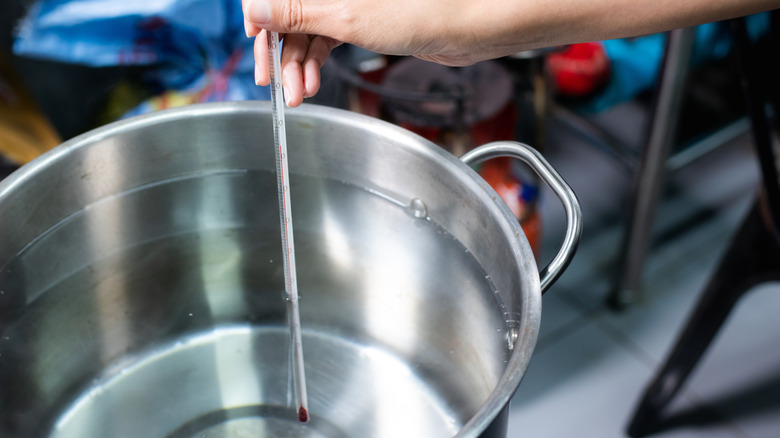How To Make Raw Eggnog That's Safe To Drink
We may receive a commission on purchases made from links.
Historians suspect that eggnog derives from a medieval drink called a posset, which featured spiced milk and was served warm with eggs. By the 18th century, it had made its way across the Atlantic to the colonies and evolved into a holiday beverage. While you can add peppermint to store-bought eggnog to liven things up, it's worth making your own for the decadent, rich flavor that just doesn't come pre-bottled. But how do you make eggnog safely with raw eggs?
Natalie Migliarini, author, creator, cocktailian, influencer, and founder of Beautiful Booze, notes that "if you are not cooking the eggnog mix you must use high-quality eggs that are pasteurized." Only around 3% of raw eggs you buy at the grocery store are pasteurized, which simply means they have been heated to at least 138-140 degrees Fahrenheit to kill off any salmonella and make them safe for raw consumption.
Migliarini notes that you can use either raw or cooked eggs when making eggnog at home but that, "as someone who likes drinks to be as simple as possible, the uncooked method is going to be the easiest preparation." However, if you are going to be offering your homemade eggnog to anyone who is at a higher risk for fatality from salmonella poisoning (the immunocompromised, older people, and children, as well as pregnant people), it is best to pasteurize the eggs before use. This will make your eggnog safer to drink but takes a bit more effort.
How to pasteurize eggs at home
It can be difficult, if not impossible, depending on where you live, to find pasteurized eggs, and if you do come across them, they can be mighty expensive. Luckily, you don't need any fancy equipment to pasteurize eggs yourself. All you need is a pot of water and a cooking thermometer.
Put the thermometer in the pot and heat the water to 140 degrees Fahrenheit then drop in your eggs and let them warm up for at least three minutes (you can add an extra thirty seconds if you like to be cautious). Don't let the temperature rise above 140 degrees Fahrenheit, as this will start to hard boil your eggs. After time is up, strain or remove your eggs from the warm water and place them in a bowl of iced water so that they don't keep cooking. Bear in mind, even with pasteurization (especially at home where temperatures are less tightly controlled) there is still a risk of food poisoning – even store-bought eggnog has been recalled in the past due to salmonella concerns.

